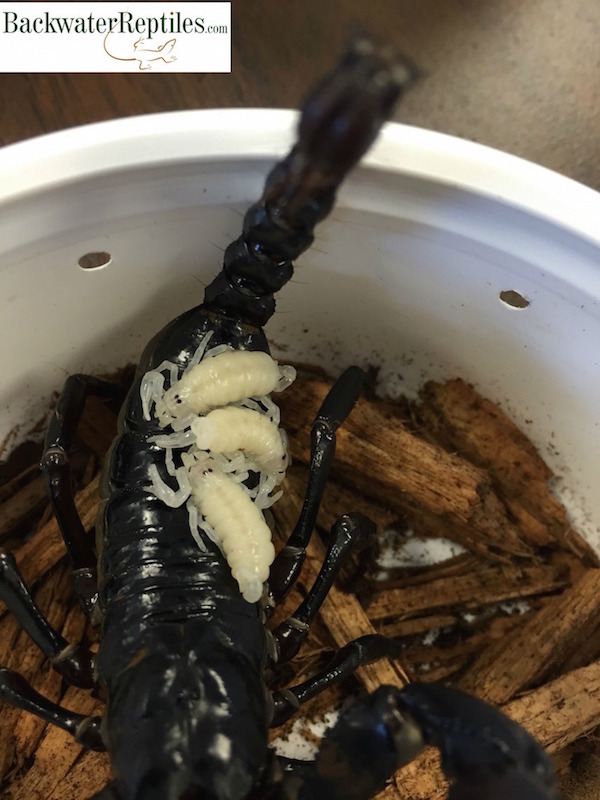Are you wondering how scorpions reproduce? Believe it or not, baby scorpions are birthed live and do not hatch from eggs! They develop within the female scorpion until they’re ready to emerge.
The easiest sign of a pregnant scorpion is a heavily swollen mid-section. The area will look taught, and the exoskeleton sections will be stretched. Breeding scorpions isn’t considered difficult, but at the same time, rarely occurs in captivity because not many people are attempting it.
Newborn scorpions hitch a ride on their mother’s back until their exoskeletons harden, which generally takes 1-3 weeks. After they have sturdy exoskeletons to protect them, they scuttle off and live individual lives.

Scorpion Reproduction Isn’t Always Pretty
These baby Asian Forest scorpions (Heterometrus spinifer) will grow up to be between three and a half to five inches long and they will live an average of six to ten years, making them long-lived pet companions.
The babies are ready to head to new homes after approximately one month–after they have undergone several molts. The mother will sometimes consume the babies if you’re not careful, so check on them often–scorpion reproduction isn’t always cute and cuddly.
Because they primarily eat insects and don’t get very large, Asian Forest Scorpions (and scorpions in general) are very easy to keep and maintain.
Their habitats can be fairly small and several can even be housed together, although it’s not highly recommended. If you are keeping more than one per enclosure, please ensure that each scorpion has its own hide, and plenty of food (crickets, waxworms, mealworms).

Due to their venomous nature, it’s not recommended to handle your scorpion without proper protective gear and the right equipment, although in general, scorpions are fairly docile.
It’s been said (although we haven’t tested this statement ourselves!) that at worst, a scorpion’s sting is just a little more painful than a bee sting. Their venom is one of the most valuable liquids on planet earth, valued at $38,858,507 per gallon according to a recent Wall Street journal article!
We’ve heard that if you’re allergic to a bee sting, a scorpion sting is just as dangerous, but this is hotly debated.
Hopefully we’ve been able to thoroughly answer the question, “How do scorpions reproduce?” If not, please drop us a line.
Although these particular little guys won’t be ready to be sold to new homes for around a month, you can still get your very own scorpions from Backwater Reptiles for only $12.99. Check out our selection of Asian Forest Scorpions for sale today!
